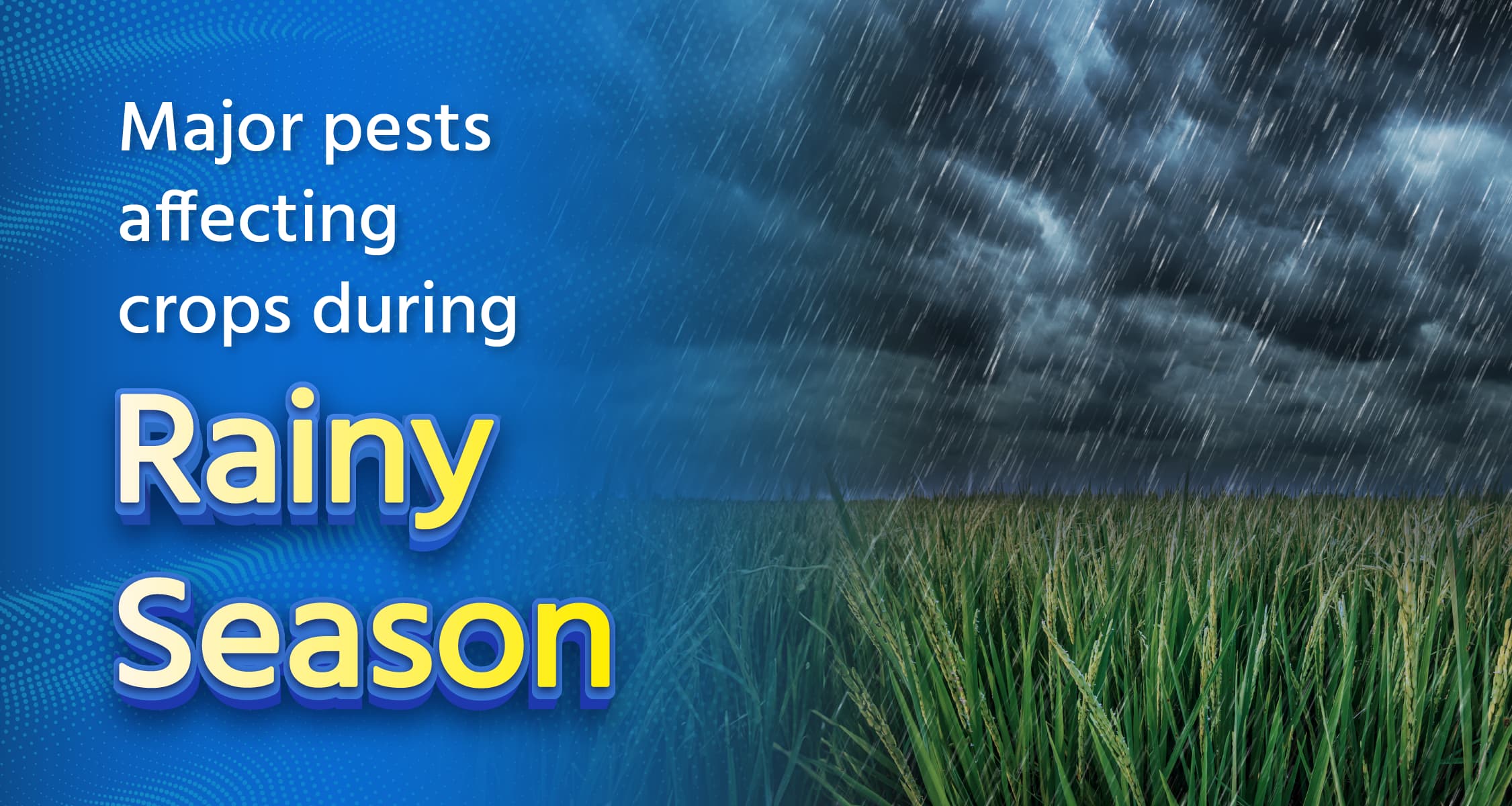Major Pests Affecting Crops During the Rainy Season

The rainy season is considered a blessing for some crops, but it also increases the risk of pest attacks on crops. The high humidity and moisture in the environment during this season accelerate the breeding of pests, causing significant damage to crops. If these pests are not controlled in time, they can severely affect crop yield and quality. Therefore, it is essential for every farmer to identify the major pests that affect crops during the rainy season and to know the measures to control them. In this post, we will learn about some of the major pests that impact crops the most during the monsoon season.
Damage Caused by Pests During Rainy Season and Their Control
Damage Caused by Stem Borers
- The stem borer pest, also known as the stem borer insect, is notorious for causing significant damage to crops. The larvae of this pest bore into the plant's stem, leading to wilting. If not controlled in time, the affected plants can be destroyed. The damage caused by this pest can be severe, with some cases showing up to a 50% reduction in crop yield.
Methods to Control Stem Borers
- Apply 50-80 ml of Thiamethoxam 12.6% + Lambda Cyhalothrin 9.5% ZC (DeHaat Entokill) per acre of field.
- Apply 4 kg of Fipronil 0.6% GR (DeHaat Slaymite Ultra) per acre of field.
- Apply 120 grams of Flubendiamide 20% WG (Tata Rallis Takumi, Pi Fluton, Swal Kabukey) per acre of field.
- Apply 400 ml of Quinalphos 25% EC (Dhanuka Dhanulux, Syngenta Ekalux, Hifield Defender, Sumitomo Kemlox) per acre of field.
Damage Caused by Aphids
- Aphids, commonly also known as "Mahu," are very small insects that suck the sap from leaves and other tender parts of plants. This causes the leaves to curl and hinders the plant's growth. These insects live in groups and can cause significant damage to crops in a short period of time. Aphids also secrete a sticky substance called honeydew, which increases the risk of fungal diseases in plants. Due to this pest, there can be a considerable reduction in crop yield.
Methods to Control Aphids
- To control these pests, use one of the following pesticides:
- Spray 100 grams of Thiamethoxam 25% WG (DeHaat Asear) in 200 liters of water.
- For each acre of field, mix 100 grams of Emamectin Benzoate 5% SG (DeHaat Illigo) in 200 liters of water and spray.
- Mix 80 milliliters of Chlorantraniliprole 18.5% w/w SC (FMC Coragen) in 200 liters of water and spray at the rate per acre.
Damage Caused by Whiteflies
- Whiteflies suck the sap from the leaves, tender branches, flowers, and pods of plants, which hinders the growth of the plants. When this pest infests crops, it reduces the yield and also affects the quality. Additionally, these insects act as vectors, spreading viral diseases to other plants.
Methods to Control Whiteflies
- Mix 300 ml of Chlorpyrifos 50% + Cypermethrin 5% EC (DeHaat C-Square) in 150-200 liters of water and apply it per acre.
- Mix 300 grams of Acephate 50% + Imidacloprid 1.8% SP (UPL Lancer Gold) in 1200 liters of water and spray it per acre.
- Apply 80 grams of Acetamiprid 20% SP (Tata Rallis Manik) in 200 liters of water per acre of the field.
Damage Caused by Thrips
- Thrips insects suck the sap from leaves, tender branches, and flowers of plants. This causes the leaves to gradually turn yellow and sometimes curl downwards. Over time, the plants become weak and start to wilt. These sap-sucking insects can also rapidly spread virus-borne diseases.
Methods to Control Thrips
- To control this pest, spray 100 grams of Thiamethoxam 25% WG (DeHaat Asear) in 200 liters of water.
- Use 80 grams of Acetamiprid 20% SP (Tata Rallis Manik) in 200 liters of water per acre of field.
- Mix 80 ml of Thiamethoxam 12.6% + Lambda-Cyhalothrin 9.5% ZC (DeHaat Entokill) in 200 liters of water and apply per acre.
- Prepare a solution of 300 ml of Chlorpyrifos 50% + Cypermethrin 5% EC (DeHaat C-Square) in 200 liters of water and apply per acre.
Which pests are most prevalent in your crops during the rainy season, and how do you control them? Share your answers with us in the comments. For more information on protecting your crops from various diseases and pests, follow the 'Agri Doctor' channel now. Also, don't forget to like and share this post to reach more farmers.
Frequently Asked Questions (FAQs)
Q: What is pest management in crop systems?
A: Pest management in crop systems refers to the use of various techniques and strategies to control pests and minimize their damage to crops. It involves using biological, cultural, and chemical methods to prevent, monitor, and control pest populations.
Q: How can crops be protected from pests?
A: There are several ways to protect crops from pests in India, including using resistant crop varieties, practicing crop rotation, maintaining soil health, and using biological and chemical pesticides. Integrated Pest Management (IPM) is a comprehensive approach that helps manage pest populations effectively while reducing the need for chemical pesticides.
Q: What are some beneficial insects?
A: Examples of beneficial insects in India include ladybugs, bees, wasps, and predatory mites. Some of these insects can be used as part of an Integrated Pest Management (IPM) strategy to reduce the need for chemical pesticides, while bees, for example, help increase crop production.
जारी रखने के लिए कृपया लॉगिन करें

फसल चिकित्सक से मुफ़्त सलाह पाएँ
